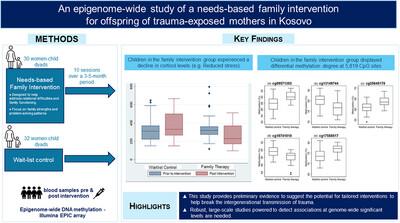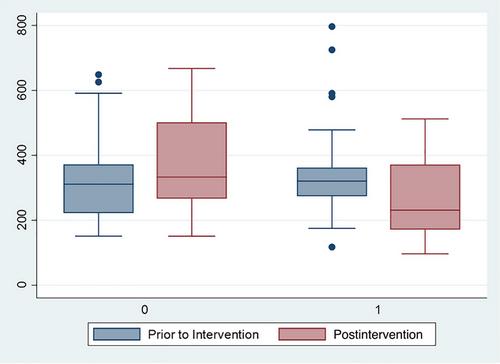An epigenome-wide study of a needs-based family intervention for offspring of trauma-exposed mothers in Kosovo
Abstract
Introduction
Maternal stress and trauma during pregnancy have been shown to influence cortisol levels and epigenetic patterns, including DNA methylation, in the offspring. This study aimed to determine whether a tailor-made family intervention could help reduce cortisol levels in children born to traumatized mothers, and to determine whether it effected offspring DNA methylation. The secondary aim was to determine whether the family intervention influenced DNA methylation aging, a marker of biological aging.
Methods
A needs-based family intervention was designed to help address relational difficulties and family functioning, and included a focus on family strengths and problem-solving patterns. Women survivors of sexual violence during the Kosovar war in 1998–1999, and their families (children with or without partners) were randomly assigned to 10 sessions of a family therapy over a 3–5-month period, or to a waitlist control group. Both mothers and children completed assessments prior to and after the intervention phase. Children's blood samples collected at these two time points were used to measure cortisol and epigenome-wide DNA methylation patterns (Illumina EPIC array). Cortisol levels, and genome-wide DNA methylation changes pre-/postintervention were compared between children in the intervention and the waitlist groups. DNA methylation age and accelerated biological aging were calculated.
Results
Sixty-two women–child dyads completed the study, 30 were assigned first to the intervention group, and 32 to the waitlist control group. In adjusted linear regression, the family intervention was associated with a significant decline in cortisol levels compared to the waitlist control (β = −124.72, 95% confidence interval [CI]: −197.4 to −52.1, p = .001). Children in the intervention group, compared to the waitlist control group, showed >1% differential methylation degree at 5819 CpG (5'—C—phosphate—G—3') sites across the genome (p < .01), with the largest methylation difference being 21%. However, none of these differences reached genome-wide significant levels. There was no significant difference in DNA methylation aging between the two groups.
Conclusion
We find evidence that a tailored family-based intervention reduced stress levels in the children (based on cortisol levels), and modified DNA methylation levels at a number of sites across the genome. This study provides some preliminary evidence to suggest the potential for tailored interventions to help break the intergenerational transmission of trauma, however, large studies powered to detect associations at genome-wide significant levels are needed.



 求助内容:
求助内容: 应助结果提醒方式:
应助结果提醒方式:


